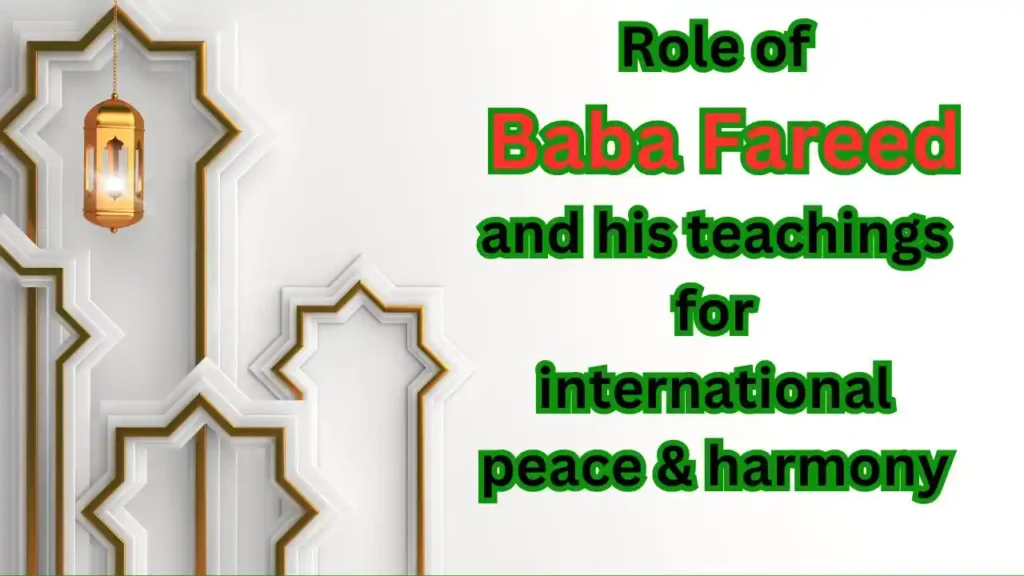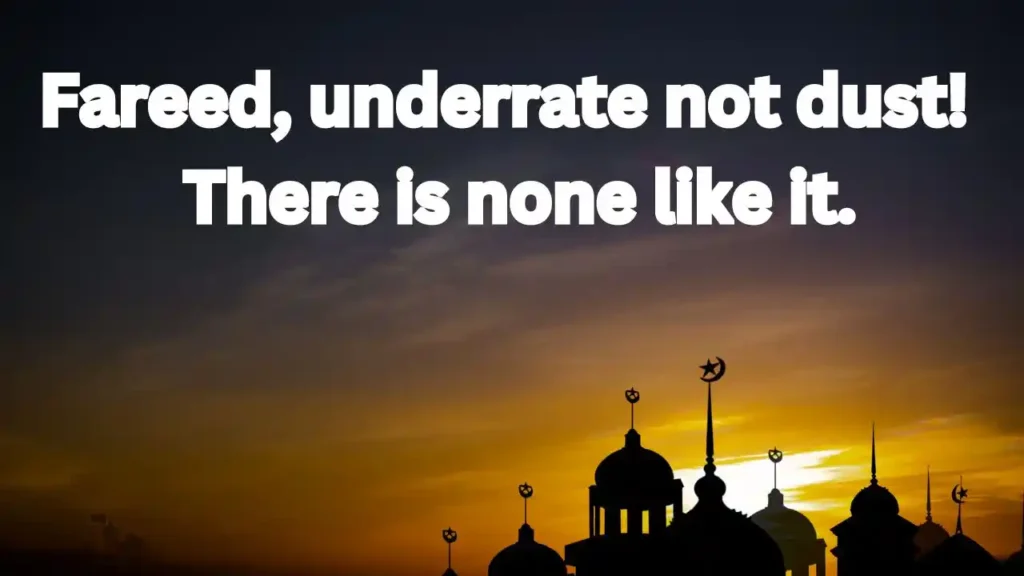Baba Fareed – The roaring Mongols headed by Halagu Khan, who destroyed Baghdad and hence the Abbasid caliphate—the so-called seat of Muslim political centrality—left the Muslim world in disarray and forced conformity in the 13th century. During these chaotic times, a galaxy of Sufi Masters—among them Baba Fareed, Maulana Rumi, Qalandar Lal Shahbaz, and Bahauddin Zikriya Multani are a few notable ones—worked to preserve and revive the eroding spirituality in the Muslim world.
The entire Muslim world was engaged in both offensive and defensive warfare. Massive migration was the norm, and a large number of Muslim thinkers and Sufis traveled to India because, under the newly formed Delhi sultanate founded by the Slave dynasty, the country was relatively peaceful and rich.
Only Fareed was watching all of this from a different perspective and organizing the world’s first major social revival and peacekeeping effort. He made a lot of trips and interacted with both ordinary people and visionaries in order to identify the weak points and locate empowering roles models and activities.
Baba Fareed moved to Ajodhan, a distant place to dwell, from Delhi. Contrary to what is frequently said in his biographies, it was not for fasting, prayer, or religious obligations. He refrained from founding a vast network of religious seminaries or many mosques since he was fully aware that these actions were impractical and would not be able to save mankind from the Mongols. They can only become unbeatable and undestructible via introspective transformation and the mass spiritual awakening.
Also Read: Miserly is a bad habit

While he had set out on the real road of inner peace and social harmony for all peoples and all eras, Hansi and Delhi were analogous to the seat of political power and conspiracy. He became the embodiment of “Al Faqr fakhri wa al Faqr minee” after selecting “Faqr,” the central concept of Sufism.
He became the legitimate heir to Hazrat Muhammad (SAW)’s Faqr and founded the first special Faqr training institute in Ajodhan, where he taught his students the fundamentals of Sufi Economics, Sociology, Politics, Ecology, Metaphysics, Literature, Psychology, and Comparative Religions. Those who did well were appointed as Deputy and given written instructions to go and spread that knowledge and skill throughout India and other nations.
Because Baba Fareed understood that genuine rulers are rulers of hearts, not heads, he carried out all of this quietly and without the assistance of the ruling class. He was neither a government treasury beneficiary nor a courtier. Few people were aware that this impoverished Ajodhani was the true ruler of 13th-century India, the approved deputy and heir to Hind al wali Khawaja Moeen uddin Ajmeri, even though he had nothing to do with Shaikh ul Islam or the tax collector.
- Farid! When you get blows,
don’t return the blow for blow.
Give them a foot kiss and bow
Better homewards go after that.
Baba Fareed espoused moderation in opposition to radicalism. His entire message is to put an end to radicalism in all its manifestations, including political, social, religious, linguistic, and economic. His poetry’s style and diction have led to claims that he was the first poet to write in Punjabi, Poorbi, Urdu, and Sindhi simultaneously.

Through his message, the man who preferred needles to scissors brought people from all languages and dialects together to form one common whole. He sung in everyday language, using extremely rustic similes and metaphors, solely to draw attention to the significant shift he was working to bring about.
His way of living, eating, talking, and dressing never claimed to be that of a great Master with unique privileges; rather, it was a tower of love and peace, in which people could put their faith and used to come to him to confide in him, tell their secrets, and seek his advice and assistance.
- And if you seek the Lord, Fareed, be the lowest of all grass.
Cut, peeled, soaked, and crumpled
melted into a heap and braided into carpets for prayer
Then and only then does it get admitted.
In the Lord’s dwelling
Sufis are global thinkers, yet the Sufis of the Indus Valley have shown a particular reverence and affection for their homeland. They’ve all praised it and sang about it a lot. In this sense, nationalism has assimilated into the Sufism of the Indus Valley. As the founder of this movement, Baba Fareed has imparted knowledge on the value of land in a distinctive and appropriate way.
- Fareed, underrate not dust!
There is none like it.
It licks your feet as long as you live.
And it covers your head as you pass away.
Sufism is the religion of Jihad Akbar, or the interior, everlasting transformation for the better, of which Baba Fareed is the biggest proponent. “Avoid the ignorants,” the Holy Quran advises (Al Airaaf 199), and Baba Fareed advised us to never challenge the ignorant.
His approach, which is to ignore, is the center ground between avoidance and confrontation. A Sufi follows his own path, which is exclusively his own. He doesn’t copy other people. Highest order gnostics, such as Baba Fareed, create their own curriculum, training manual, and methodology, which seekers are taught and continue to follow for decades.
Ajodhan’s Sufi center produced a lot of men, but Nizamuddin was a unique kind. Baba Fareed’s plan to save mankind from ignorance, fanaticism, poverty, sickness, cruelty, and injustice had reached a mature stage, which is why he was sent to Delhi. Now, Delhi, a 13th-century cosmopolitan metropolis, would be the hub of activity. In the history of the subcontinent, Basti Nizam in Delhi was the first Sufi commune. It endured six sultans’ oppression and persecution while offering a substitute for oppressed individuals from all faiths and beliefs.

Nizamuddin Auliya did not engage in avoidance or confrontation; instead, he stuck to his policy of avoiding the stupid people in politics and religion. Baba Fareed’s vision came to pass in Basti Nizam, and the nation’s capital city became the birthplace of the first ever harmonious community comprising individuals of all genders, castes, and religions. Nizamuddin Auliya became Delhi’s true Sultan of Hearts. Despite their repeated demands, he never met or received a favor from a sultanate.
Every visionary from throughout the Muslim world came to Basti Nizam to learn Baba Fareed’s practical teachings. Basti Nizam was a Sufi hub of wisdom, knowledge, and practice that was nonsectarian and ecumenical. Basti Nizam was implementing socialism and communism during a time when the inhabitants of this region were ignorant of these ideologies, thanks to Baba Fareed’s global vision and goal.
All of it is incorporated in the teachings of Baba Fareed, the human incarnation of Faqr-e-Muhammadi, which are known as the Universal Declaration of Human Rights. His deputies worked to build tranquil communities throughout the globe in order to quell radical impulses in society. They represented the values of compassion, love, selflessness, humanity, wisdom, the arts, dance, music, poetry, meditation, forebearance, and ongoing social transformation.
Baba Fareed’s vision and goal made their marks early on; his message and methodology were incorporated into the fundamental teachings of Bahgti, Guru mat, Sant mat, and Sikhism. In addition to being Muslim, Indian, and Indo-Surian, Fareed is a worldwide symbol of harmony and peace. The Faridi heritage grew globally. Based on the same Sufi philosophy of self discipline, his message of internal individual peace also encompassed communal, social, national, and worldwide peace.
Although Rumi is the most well-known Sufi in the world today, his contributions were solely literary. Although it cannot be compared to Baba Fareed’s vision and goal, we have not done enough to highlight the significance and usefulness of the magnificent Faridi legacy. Fareed is not limited to Pakistan; he rules the entire globe. It is past time to highlight this distinctive Sufi movement and implement the Faridi plan for enduring global peace.